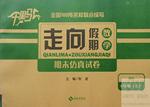题目内容
It’s amazing what a little free beer can accomplish. In 1997 the small Danish island of Samso, located in the Kattegat Strail, won a contest hosted by the Danish Ministry of Environment and Energy. Samso, then known for its dairy and pig farms, would become Denmark’s showcase for sustainable power, eventually going carbon-free. How that would happen, however, was far from clear, since the government initially offered no funding, tax breaks or technical expertise(专门知识).
Given that almost all its power came from oil or coal — and the island’s 4,300 residents didn’t know a wind turbine(风力发电机) from a grain silo(谷仓) — Samso seemed an strange choice. Soren Hermansen, though, saw an opportunity. A restless native son who grew up on a family farm, Hermansen was teaching environmental studies at a local school when he heard about Samso’s award. He volunteered to be the first — and only — participant. “I realized this could happen,” he says. “This was realistic.” He may have been the only one who thought so.
Hermansen knew Samso islanders were conservative, but that could be an advantage: once he convinced enough potential first movers to act, the rest would follow. So Hermansen showed up at every community or club meeting to campaign for the renewable-energy project. He pointed to the island’s unexplored potential for wind power and the economic benefits of making Samso energy-independent. He sometimes brought free beer.
It worked. The islanders bought shares in new wind turbines to build 11 large land-based turbines, enough to meet the entire island’s electricity needs. Not satisfied with that, they supported the construction of 10 huge offshore turbines,which provide power that the island’s dependence on cars and ferries needs. Today Samso isn’t just carbon-free — it actually produces 10% more clean electricity than it uses, with the extra power fed back into the national electricity network at a profit.
Hermansen has become a green angel, traveling from country to country telling the story of Samso’s success when he’s not at home running the Energy Academy, a research center for clean power. But he’s the first to say that the real credit belongs to the islanders,and that Samso’s lesson is that environmental change can only come from the ground up.
What was Hermansen’t response to the Samso’s winning the contest?
A. He regarded it as a chance.
B. He was not satisfied with the award.
C. He thought it was strange.
D. He thought it was reasonable.
From the second paragraph we can learn that __________.
A. many Samso islanders participated in the green project actively
B. most Samso islanders were against the renewable energy project
C. Samso has a long history of making use of renewable energy
D. at first people showed little interest in the renewable energy project
Why did Hermansen show up at every community or club meeting?
A. It was his duty to keep the islanders informed of government policies.
B. He wanted to convince the islanders to use clean power instead of oil or coal.
C. He wanted to persuade the islanders to be involved in the wind power project.
D. He wanted to share his beer with other islanders.
What can we learn about Hermansen’s personality from the last paragraph?
A. He is practical. B. He is courageous.
C. He is modest. D. He is ambitious.
【小题1】A
【小题2】D
【小题3】C
【小题4】C
解析:
略

 千里马走向假期期末仿真试卷寒假系列答案
千里马走向假期期末仿真试卷寒假系列答案